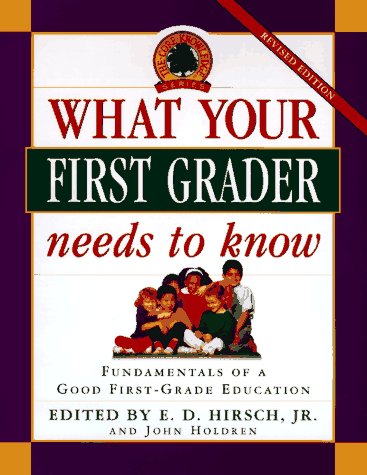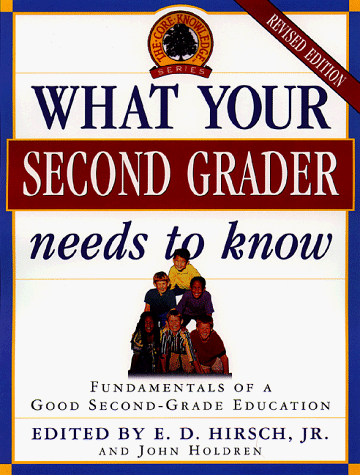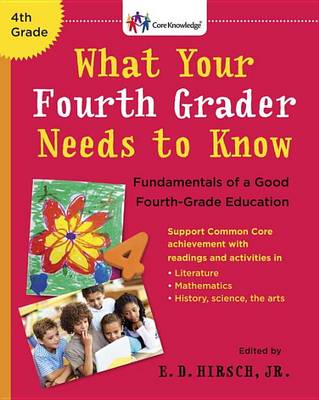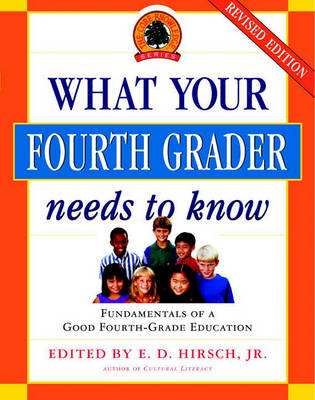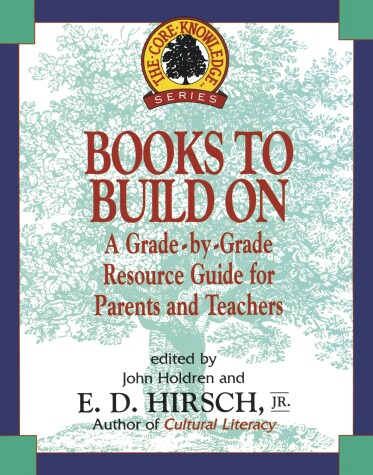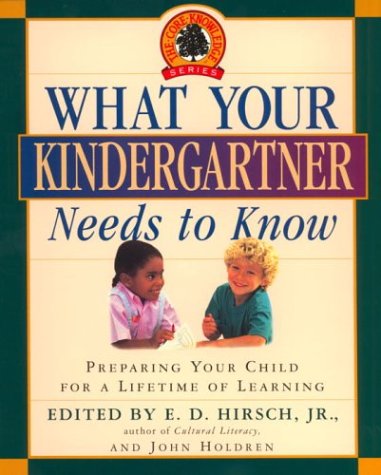Core Knowledge
6 primary works • 10 total works
Book 1
Book 2
Book 3
Book 4
What Your Fourth Grader Needs to Know
How can you help your child at home? This book answers that important question and more, offering the specific shared knowledge that thousands of parents and teachers across the nation have agreed upon for American fourth graders. Featuring full-color illustrations throughout, a bolder, easier-to-follow format, and a thoroughly updated curriculum, What Your Fourth Grader Needs to Know is designed for parents and teachers to enjoy with children. Hundreds of thousands of students have benefited from the Core Knowledge Series. This edition, featuring a new Introduction, gives today’s generation of fourth graders the advantage they need to make progress in school and establish an approach to learning that will last a lifetime. Inside you’ll discover
• Favorite poems—old and new, from the familiar classic “Paul Revere’s Ride” to Langston Hughes’s “Dreams”
• Literature—from around the world, including African and Chinese folktales, excerpts from beloved novels, and condensed versions of popular classics such as Gulliver’s Travels and “Rip Van Winkle”
• Learning about language—the basics of written English, including grammar, punctuation, parts of speech, synonyms and antonyms, plus an introduction to common English sayings and phrases
• World and American history and geography—explore world and American history, including creation of a constitutional government and early presidents and politics
• Visual arts—a broad spectrum of art from around the world, including African masks, Islamic architecture, Chinese calligraphy, and great American painters—featuring full-color reproductions
• Music—understanding and appreciating music, from the basics of musical notation to the orchestra, plus great composers and sing-along lyrics for such favorites as “Auld Lang Syne” and “Waltzing Matilda”
• Math—challenging lessons ranging from fractions and decimals to understanding graphs, making change, square roots, and the metric system
• Science—discover the wonders of the human body and its systems, learn about electricity, atoms, chemistry, geology, and meteorology, plus concise biographies of some of the great scientists of our time
Book 5
With sixteen pages of full-color illustrations, a bolder, easier-to-follow format, and a thoroughly updated curriculum, What Your Fifth Grader Needs to Know, Revised Edition, reflects the Core Knowledge Foundation’s ongoing commitment to providing a solid educational foundation for today’s elementary school students.
What Your Fifth Grader Needs to Know, Revised Edition, covers the basics of language arts, history and geography, visual arts, music, math, and science. A collection of American speeches, tales from around the world, math problems, and biographies of famous scientists add to the book’s usefulness and enhance the pleasure of both adult and child as they work together. Hundreds of thousands of children have benefited from the Core Knowledge Series. This revised edition gives a new generation of fifth graders the knowledge they need to make progress in school and establish an approach to learning that will last a lifetime.
Book 6
• Favorite Poems—old and new, from Edgar Allan Poe’s classic “The Raven” to Maya Angelou’s “Woman Work”
• Literature—from around the world, including Homer’s epics the Iliad and the Odyssey, Shakespeare’s Julius Caesar, and Mark Twain’s The Prince and the Pauper
• Learning About Language—he rules of written English, including the four kinds of sentences, common English sayings and phrases, plus an introduction to Greek and Latin roots
• History and Geography—world history from ancient Greece and the fall of the Roman Empire to the Enlightenment and the French Revolution; American history of the post—Civil War era, including the Industrial Revolution, immigration, urbanization, and reform
• Visual Arts—a brief history of art, stretching from the classical period through the Renaissance, Baroque, and Romantic periods all the way to the age of realism, with full-color reproductions and discussions of great works by artists such as El Greco, Rembrandt, and Winslow Homer
• Music—understanding and appreciating music, including musical notation, chords, and scales—plus biographies of great composers such as Handel, Haydn, Mozart, Beethoven, and Chopin
• Math—challenging lessons, ranging from probability and statistics, geometry, ratios and proportions to basic pre-algebra
• Science—fascinating discussions of plate tectonics, oceans, astronomy, the environment, the human body, and the immune system—plus short biographies of great scientists such as Marie Curie
What Your Third Grader Needs to Know
What should your child learn in the third grade? How can you help him or her at home? This book answers these important questions and more, offering the specific shared knowledge that thousands of parents and teachers across the nation have agreed upon for American third graders. Featuring sixteen pages of full-color illustrations, a bolder, easier-to-follow format, and a thoroughly updated curriculum, What Your Third Grader Needs to Know is designed for parents and teachers to enjoy with children. Hundreds of thousands of children have benefited from the Core Knowledge Series. This edition, featuring a new Introduction, gives today’s generation of third graders the advantage they need to make progress in school and to establish an approach to learning that will last a lifetime. In this book you’ll discover
• Favorite poems—old and new, from the traditional rhyme “For Want of Nail” to Lewis Carroll’s whimsical poem “The Crocodile”
• Literature—including Native American stories, African folktales, European fairy tales, classic myths from ancient Greece, stories from ancient Rome, and more
• Learning about language—the basics of written English, including sentence structure, parts of speech, and a first look at writing a report or letter
• World and American history and geography—journey down the great rivers of Europe, Africa, Asia, and Australia, visit ancient Rome, and experience the earliest days of America with the Pilgrims and Native Americans
• Visual arts—an introduction to masterworks by Rembrandt, Henri Matisse, Mary Cassatt, and others, with full-color reproductions and fun, do-it-yourself activities
• Music—the fundamentals of appreciating, reading, and making music, plus great composers, instruments, and sing-along lyrics for songs such as “Bicycle Built for Two” and “He’s Got the Whole World in His Hands”
• Math—stimulating lessons ranging from counting money to solving division problems, numbers through 100,000, graphs, and the metric system
• Science—fascinating discussions on the natural world, the cycles of life, the human body and its systems, and the environment, with accompanying activities and stories about famous scientists such as Copernicus and Alexander Graham Bell
Books to Build On recommends:
• for kindergartners, lively collections of poetry and stories, such as The Children’s Aesop, and imaginative alphabet books such as Bill Martin, Jr.’s Chicka Chicka Boom Boom and Lucy Micklewait’s I Spy: An Alphabet in Art
• for first graders, fine books on the fine arts, such as Ann Hayes’s Meet the Orchestra, the hands-on guide My First Music Book, and the thought-provoking Come Look with Me series of art books for children
• for second graders, books that open doors to world cultures and history, such as Leonard Everett Fisher’s The Great Wall of China and Marcia Willaims’s humorous Greek Myths for Young Children
• for third graders, books that bring to life the wonders of ancient Rome, such as Living in Ancient Rome, and fascinating books about astronomy, such as Seymour Simon’s Our Solar System
• for fourth graders, engaging books on history, including Jean Fritz’s Shh! We're Writing the Constitution, and many books on Africa, including the stunningly illustrated story of Sundiata: Lion King of Mali
• for fifth graders, a version of Shakespeare’s A Midsummer Night’s Dream that retains much of the original language but condenses the play for reading or performance by young students, and Michael McCurdy’s Escape from Slavery: The Boyhood of Frederick Douglass
• for sixth graders, an eloquent retelling of the Iliad and the Odyssey, and the well-written American history series, A History of US
. . . and many, many more!
